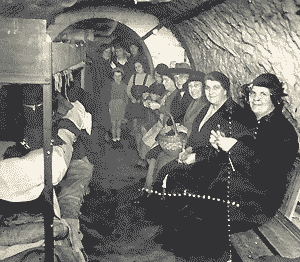|
The
"We Remember" Booklet 2006
DOVER
IN WWII
 Today,
as I look across the Dover Strait to the beckoning cliffs of
France, I find it hard to believe that just over 60 years ago we
watched that coast for a very different reason. Any day or night
the enemy’s invasion barges might have been seen arriving. Night
and day the dwindling population of Dover watched for the
flashes of the long range guns and waited for the explosions of
the incoming shells. Today,
as I look across the Dover Strait to the beckoning cliffs of
France, I find it hard to believe that just over 60 years ago we
watched that coast for a very different reason. Any day or night
the enemy’s invasion barges might have been seen arriving. Night
and day the dwindling population of Dover watched for the
flashes of the long range guns and waited for the explosions of
the incoming shells.
Before September 1939
Dover’s population was
well
over 40,000 but in 12
months had dwindled to an estimated 12,000. Most of the town’s
school children
- including myself - had been packed off on evacuation. (Some
boys and girls stayed, and the national
newspapers named them
“Dover’s Dead End Kids.” For months they received no education.)
Factories and mills closed, the cross-Channel steamers went
elsewhere for war work, Customs officers and Immigration staff
moved out. It was mainly those engaged in essential work that
remained.
They faced not only
the daily ordeal of likely shelling but also bombing, the
dropping of land mines, shot down barrage balloons falling on
their homes, the danger of being sprayed with anti-aircraft
shrapnel. More than 2220 shells, 464 bombs, three parachute
mines and a trio of flying bombs fell on the borough.
But Dover carried on.
Dover survived, often on short rations because t he
local infrastructure was battered by enemy action. Housewives.
often in clothes wearing thin, braved the dangers. Often alone.
Their husbands were serving away in far away places like North
Africa, India and Burma; their children with unknown families
where they were not always welcome. The town was flooded with
men and women in uniform. Mostly British but Dutch, Poles, a few
Free French and, later in the war, the occasional American. The
Navy boys filled the pubs which many deserted hurriedly to join
their ships and other craft that could be heard roaring out into
the Channel. Another disturbed night for Dover folk was likely. he
local infrastructure was battered by enemy action. Housewives.
often in clothes wearing thin, braved the dangers. Often alone.
Their husbands were serving away in far away places like North
Africa, India and Burma; their children with unknown families
where they were not always welcome. The town was flooded with
men and women in uniform. Mostly British but Dutch, Poles, a few
Free French and, later in the war, the occasional American. The
Navy boys filled the pubs which many deserted hurriedly to join
their ships and other craft that could be heard roaring out into
the Channel. Another disturbed night for Dover folk was likely.
It was an experience
that will never be forgotten by those who lived through those
terrible days. And an experience I hope we never have to endure
again.
Terry Sutton MBE,
Dover journalist for 57 years
Pictures:
In Winchelsea Cave - Mrs Ethel Ealden, next right
her sister, Mrs Lou Pulham, mothers of WWII casualties Walter
Ealden and John (Jack) Pulham
(see
"We Remember" 1)
Wellesley Road bombed, courtesy Dover Museum
|